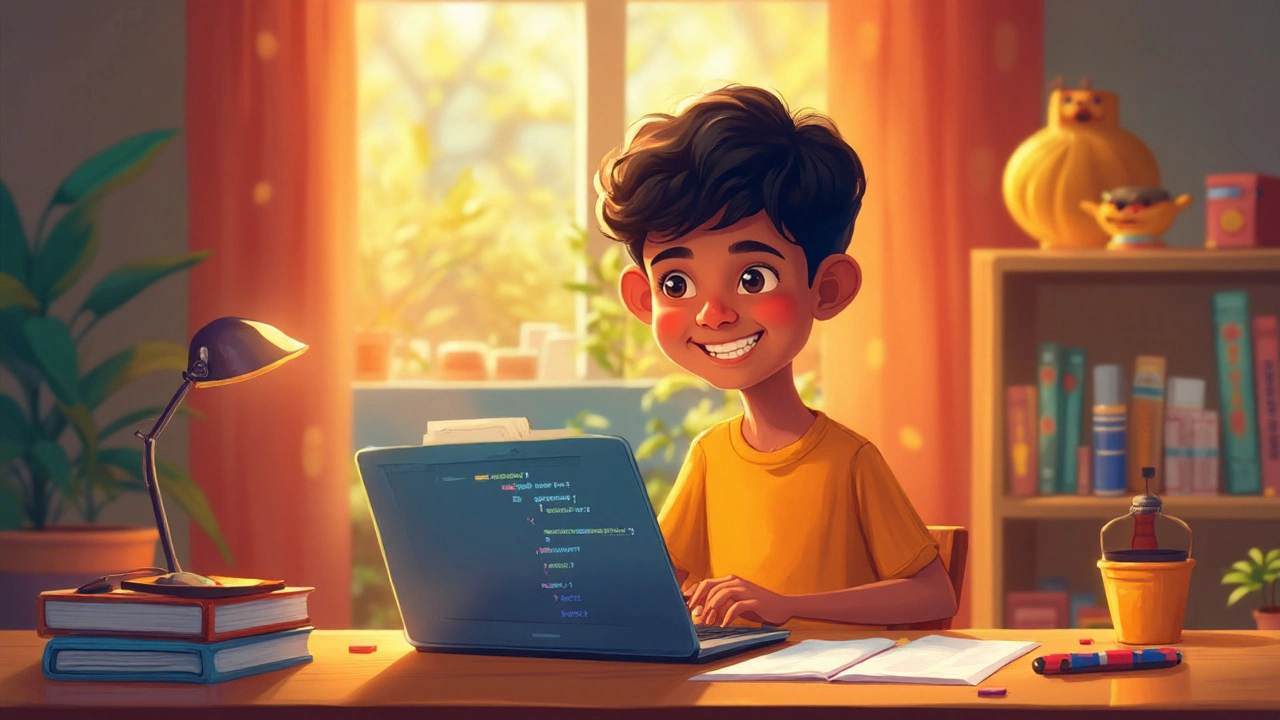Easiest Coding Languages to Learn: Your Beginner’s Guide
 Aug, 3 2025
Aug, 3 2025
Every few months, another headline screams about a new breakthrough in tech, but here’s what nobody tells you: learning to code isn’t some wild gamble or elite pursuit. It’s shockingly approachable if you pick the right language for your first step. With so many job postings, YouTube tutorials, and coding bootcamps floating around, it's tempting to think you need to take night classes for a year just to write a few lines of code. That’s not true. Your path starts with picking one of the simplest programming languages—and there really are some that make it all just click. I started the hard way (I wasted weeks on the wrong languages, trust me), but you can skip that pain. Let’s slice through the noise and focus on what actually matters.
Why "Simple" Coding Matters and Who Should Care
So, why should you care about simplicity when choosing a language? Picture this: you’re fired up to build a portfolio site, automate your Excel chores, or even dive into game design. Picking an unnecessarily complex programming language is like deciding to learn guitar by mastering flamenco first. Nobody does that. Most people (and companies) are crying out for folks who understand the basics—problem-solving, clear code, and practical tools for today’s problems—not super-niche algorithms or theory. According to a 2024 Stack Overflow survey, over 50% of professional developers started with a language known for its simplicity (with Python leading the pack). Cutting through that early confusion gives beginners the confidence to actually stick with coding.
Learning your first language is all about removing friction. You want something forgiving, with a friendly community and tons of practical resources. Forget impressing the gatekeepers—focus on languages where you can write "Hello, World" in just one or two lines, solve actual problems after a couple of days, and ask Google a basic question without feeling like you need a PhD in logic. The coding world is huge, but the entry point doesn’t need to be a fortress.
Which Coding Languages Are the Simplest to Learn?
If you put ten developers in a room, you’ll get eleven different opinions. But let’s keep this grounded in reality and focus on four programming languages that are wildly popular with both newcomers and hiring managers alike. No fluff—just what works today for folks getting started:
- Python: It reads almost like plain English. Even journalists and scientists who swear they “aren’t technical” pick this up fast. No weird brackets or endless code blocks. Most Canadian universities now use Python in first-year courses for a reason.
- JavaScript: If you’ve ever wanted to make websites more interactive or work in digital marketing, you’ll need it. It’s the backbone of web browsers, and you see results in real-time.
- Ruby: Slightly less famous nowadays than the big dogs, but if you want clear, readable code for building web apps, it’s one of the friendliest ways to start.
- S Scratch: Designed literally for kids, using drag-and-drop blocks. Toronto schools use it to teach grade 5 students the logic behind programming, setting them up for more advanced stuff later.
Among these, Python dominates for simplicity and versatility. According to the TIOBE Index (as of July 2025), Python is the world’s most popular coding language, ahead of every other general-purpose language by a solid margin. It powers everything from Instagram’s back end to NASA’s space research scripts.
| Language | Learning Curve | Uses | Community Size (millions on GitHub) |
|---|---|---|---|
| Python | Low | Web, data, AI, scripting | 9.3 |
| JavaScript | Low | Web, mobile, games | 7.5 |
| Ruby | Low-Mid | Web, scripting | 1.3 |
| Scratch | Tiny | Education, games | 0.3 |
If you want a less abstract answer: unless you have a specific target like robotics or embedded systems, Python is usually the best place to begin for English speakers—or really, anyone globally. JavaScript is a close second for those into web stuff.

How to Learn the Simplest Coding Quickly and Effectively
If you’re just starting out, don’t fall for the online trap of collecting endless YouTube links or bookmarking a thousand free courses and then burning out. Here’s a concrete roadmap for making real progress, no matter where you live (trust me, you can do this from a Toronto apartment or a tiny town—doesn’t matter):
- Pick a single language (Python is gold for most), and ignore the rest for now. Multitasking kills momentum.
- Install something like Visual Studio Code (it’s free and works everywhere), or just use an online playground like Replit or Trinket. No fancy hardware needed.
- Set up tiny, daily goals. Instead of "learn Python," aim for "write a script that asks for my name and prints it back." You get results fast, so it feels rewarding.
- Lean on community: Stack Overflow, Reddit’s r/learnprogramming, and even Discord servers keep you motivated and help you out of sticky spots. There’s no shame in asking basic questions—everyone started somewhere.
- Don’t bother with endless lists of programming terms. Focus on doing. Play with small, messy projects—maybe a calculator, or something that scrapes the price of hockey tickets online. Build, tweak, break, fix.
- Mix in learning platforms like Codecademy, Khan Academy, or CS50x from Harvard if you want more structure. Most of them are free or have great trial periods. Many have custom learning tracks for beginners with zero experience.
If you hit a wall (and you will), try changing up your projects rather than giving up. Bored with text-based programs? Try something visual with Scratch or Python’s Turtle module. Some learners get stuck because they assume they’re just "not coding people." Usually, the real problem is trying to run before walking, or making things way more complicated than they need to be.
How Coding Simplicity Pays Off in the Real World
You might wonder: does starting with an "easy" language put me behind in the long run? It’s actually the opposite. The top tech companies, from Shopify (founded here in Canada) to Google, routinely hire developers who started with basic languages and built up their skills project by project—not those who tackled the most intimidating tools first. Once you get the fundamentals down, picking up another language isn’t a giant leap but a few steps over. University programs across Ontario and BC have publicly shifted their intro courses to Python and JavaScript after seeing improved course completion rates; students just stick with it longer when it’s approachable.
Simple coding pays off in side projects too—maybe it’s that home automation script, a business dashboard, or hitting a hackathon with friends. You don’t need a tech degree or even a bunch of spare cash for bootcamp tuition. The explosion of online tutorials (the best ones are sometimes tucked away in forums or ten-year-old blogs) means you can find a solution or beginner project for basically anything you want to try.
The main thing: don’t get bogged down by snobs telling you that “real programming” needs to be painful. The simplest language—*for you*—is the one you’ll actually use and enjoy. That’s how you go from zero to dangerous, impressing your friends with your chatbot or automating your spreadsheets all on your own.